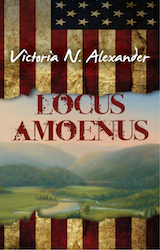 Award-winning actor Ben Jorgensen will be reading the audiobook version of Victoria N. Alexander’s new novel Locus Amœnus, which is due to be released in hardcover at the end of April. The story is told by Hamlet, whose mother, a 9/11 widow, has recently married a corrupt bureaucrat named Claudius.
Award-winning actor Ben Jorgensen will be reading the audiobook version of Victoria N. Alexander’s new novel Locus Amœnus, which is due to be released in hardcover at the end of April. The story is told by Hamlet, whose mother, a 9/11 widow, has recently married a corrupt bureaucrat named Claudius.
Beginning his acting career as the boy in Calvin Klein’s Obsession commercials directed by Richard Avedon, Ben Jorgensen’s credits include feature films, The Break with Martin Sheen and The Basketball Diaries with Leonardo DiCaprio. He won Emmy and GLAD awards for his portrayal of the gay teen Kevin Sheffield in All My Children and also had a feature role in As the World Turns. His most recent theater credits include What Will People Think!?, a Strawberry festival finalist, A Season in the Congo at La Mama, Hamlet (as the ghost) and Trial and Treason in the lead role as President. He also wrote and acted in the original play Manny’s Last Stand, starring Austin Pendleton, which was chosen to open the Summer Strawberry festival in 2013. He is currently working on his own version of Hamlet as a blues Opera.
The audiobook will be available late summer. Order a hard cover edition of Locus Amœnus from Amazon at a 13% discount for a limited time. (Next week the discount will be 12% then 11%…)






 Top universities actively recruit homeschooled applicants. On average, they test 37 percent above public and private school students and tend to be better prepared for life, career and college. Is it time to rethink our educational system?
Top universities actively recruit homeschooled applicants. On average, they test 37 percent above public and private school students and tend to be better prepared for life, career and college. Is it time to rethink our educational system?